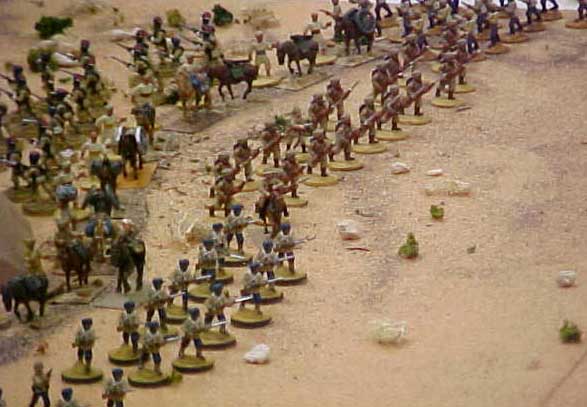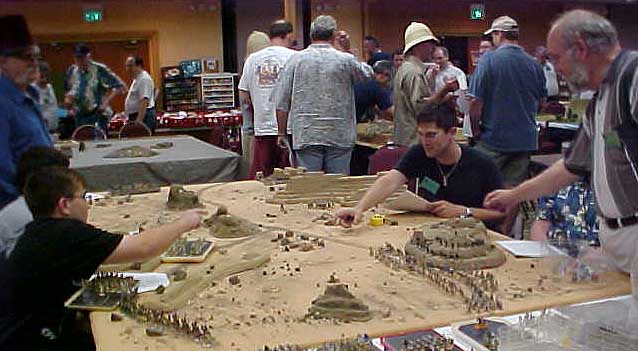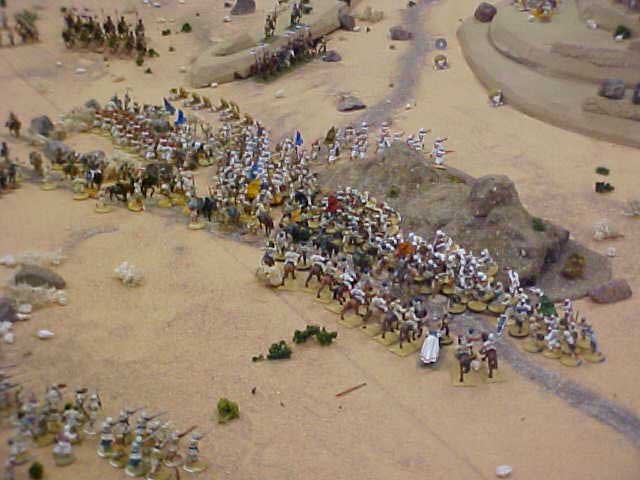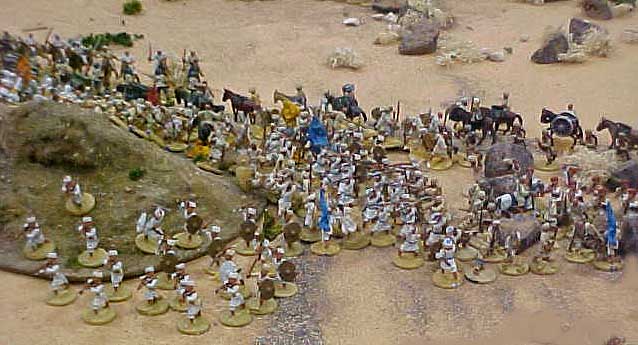

Jay Stribling's game at RECON 2005
The Last Pack Train out of Ahoogastan
Using Larry Brom's colonial rules set The Sword and the Flame
Jay Stribling recycled an old scenario which was originally played on March 4, 2004 as part of our North Central Frontier campaign. You can see the orginal game here: A Hard Day in Ahoogastan. The British (mainly Indian army units) are moving a supply train, out of Ahoogastan, headed for the Bulgur pass, thence to Jellybad.
The Pathans of Ahoogastan (Ahoogastanis is SUCH a clumsy word) regard the British Mules as the finest of animals, and feel that Allah created them just for use in Ahoogastan. They aim to steal every mule. The main object of this game is to have posession of the mules at the game's end.
In his innocence, the Stribling believed that the gamers in South Florida would behave much like the gamers in Jackson MS who originally played this game. In this, Stribling could not have been more wrong!
Victory conditions
To WIN - The British must get the pack train to the fortified village. OR have the most pack animals left at the end of the game. The Pathans must merely have the most pack animals left at the end of the game. Please note - Dead mules have NO value!
The Pathans are allowed to fight among themselves in close combat- winners capture the mules - but they will not intentionally shoot at each other!

Photo by Lori Brom
Stribling is placing figures on the table in preparation for the game. This game immediately followed Mark Stevens' game The Lost Patrol and used some of the same terrain.

Photo by Lori Brom
The column, just starting out - looking clean and well ordered. There were 15 mules in the train.
The forces involved
The British began the game with seven infantry units and two unitc of cavalry. They will have a mounted officer for each player and a commander-in-chief with his aide. More British units, including artllery, awaited the column, just around the last bend. Alas - the British did not make it quite that far!
The Pathans had 12 units of infantry in five "tribes" and a small mounted unit. Some tribes had 3 units, some had two. Each tribe will have a mounted leader and the supreme war leader, the "Khan" was also present.

Photo by Lori Brom
Some of the players are assisting with the set-up. Stribling seems to be saying "No, not THAT one..."

Photo by Lori Brom
During the game, Stribling holds up three fingers, indicating that three units can move on that side.
Whenever a card was drawn for movement (Red cards meant British movement, Black cards meant Pathan movement) Stribling would roll four-sided die. That many units could move at that time.

Photo by Lori Brom

Photo by Lori Brom
Note the red arrow. The Pathan player on the hill grew weary of the diplomacy of his superiors and on turn five, just charged! That precipitated a mass melee which one viewer described as "the Mother of all Melees." Pathans were fighting Pathans, the British Indian Army units were fighting Pathans, some Pathan units attempted to remain neutral, in hope of later rewards...
Notes on the Mules

Photo by Lori Brom
Another view of the mess. The Afgans are making off with some mules and fighting still ranges around the front of the column (to the right in the photo).

Photo by Lori Brom
The tribe of Pathan warriors closest to the camera has had enough. After losing their part of the fight in "The Mother of all Close Combats" they head for home. With NO mules.
Diplomacy and Duplicity
As mentioned before, the game-master found that this game did not go anything like the previous play of this scenario. The British players began negotiating with their Pathan opponents before the column ever set out on it's journey. They negotiated free passage along the trail at the expense of a certain number of mules.
The Game-master began to rip his hair out at the sight of the British and the Pathans marching side-by-side with some Pathans fighting to keep the other Pathans from attacking the column! The British would not even fire at the Pathans, and the tribesmen returned the favor!
All of this finally came unravelled just before the trail would have turned the corner and the column would have been visible to the British fortified outpost.

Photo by Lori Brom
Another view of the mammoth action. Note the British cavalry which, pretty much fought it's own battle, constantly being harrassed by the Pathans, but too far to aid in the great, last, close combat.
Recovery from Wounds
At the end of each turn, the game-master intended to add a "Recovery Phase". A D6 will be rolled for each wounded man (NOT for mules).
Actually the game was so chaotic and the game-master so overwhelmed by the duplicity of all involved, that he completely forgot the recovery of wounded...
Winners and losers!
SO - who won this mad affair? The Pathan that said "I have had enough of this madness" and charged down the hill, precipitating the "Mother of all Melees" won the game. He had 6 mules when the dust cleared. Another Pathan had 3 mules, one mule had been shot dead, and the British had 5 mules left.
Return to the Master list of Photos and Games
Go to the Colonial Games Page for the Jackson Gamers
Return to the Jackson Gamers' homepage
Angelfire - Free Home Pages
Free Web Building Help
Angelfire HTML Library
htmlGEAR - free polls, guestbooks, and more!
Thank you for visiting The Jackson Gamers' pages at Angelfire. Please come back and visit again!